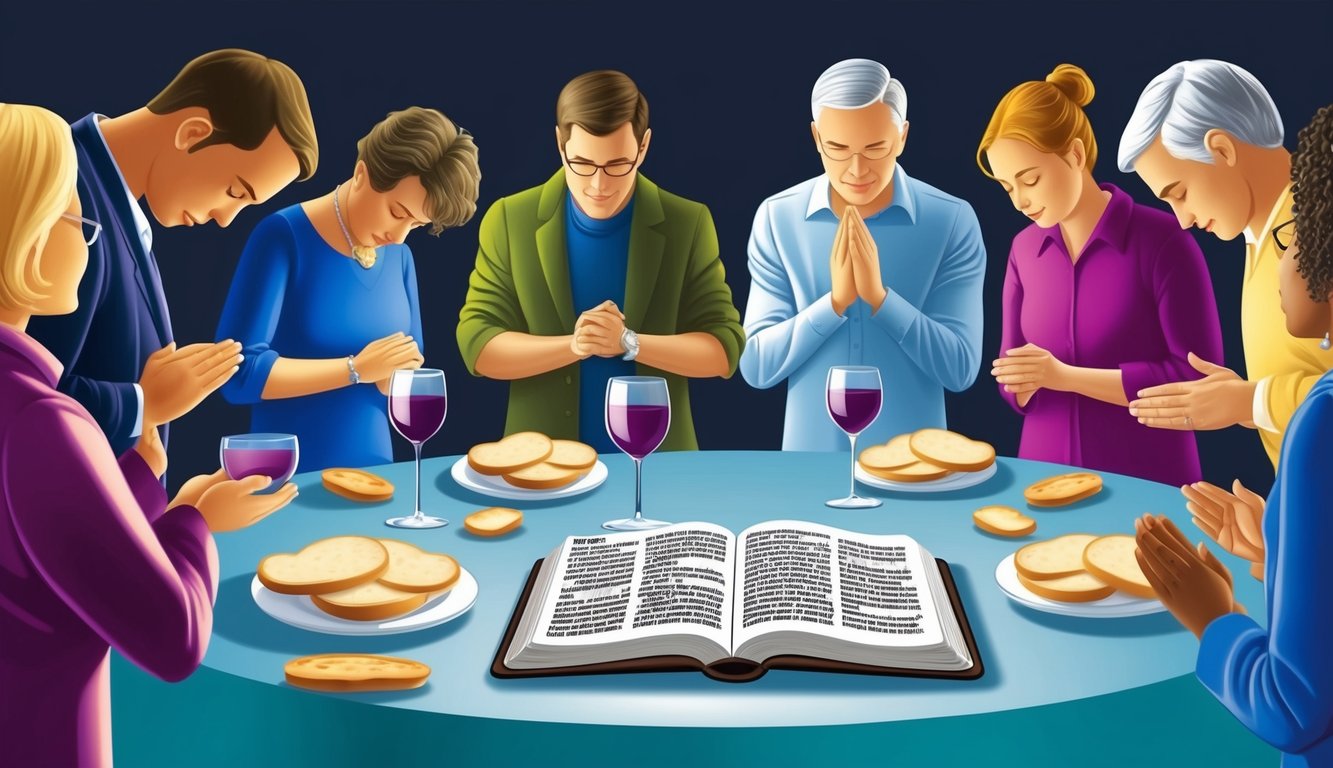Don’t Miss Out On This Unique Astrological Opportunity
Are you tired of spinning your wheels and getting nowhere? Simply put, you’re out of sync: you’re out of alignment with your astral configuration.
But: there’s a kind of map that can help you reclaim your alignment. Think of it as your own personal blueprint to success and happiness: a blueprint that will help you live your most amazing life.
Get started here.
Exploring what the Bible says about drinking can provide insight into many of its teachings on personal behavior and spirituality.
While the Bible contains references to wine and alcohol, it neither outright condemns nor wholeheartedly promotes drinking alcohol.
For example, there are passages where wine is depicted as part of celebrations and blessings, but there are also warnings about overindulgence and the dangers of drunkenness.
Understanding the Bible’s stance involves looking at both the Old and New Testaments.
Throughout these texts, wine is considered a customary drink, even used symbolically in religious ceremonies like Communion.
Yet, certain scriptures caution against excessive drinking, emphasizing self-control and the potential for alcohol to lead one away from a righteous path.
For many believers, looking at both the admonitions and allowances in the scriptures provides a balanced view.
Personal choice, influenced by faith and individual circumstances, plays a key role in determining one’s approach to alcohol consumption.
Exploring these perspectives can lead to deeper reflections on how personal behavior aligns with biblical teachings.
Key Takeaways
- The Bible does not wholly condemn or endorse drinking alcohol.
- It emphasizes moderation and warns against overindulgence.
- Personal choice should consider biblical teachings and self-discipline.
Biblical Perspective on Alcohol
Understanding the biblical view on alcohol involves exploring its role in religious contexts, the warnings about excessive consumption, and the importance of moderation.
God and Wine
In the Bible, wine is often seen as a gift from God, used in celebrations and religious ceremonies.
Christ’s miracle at the wedding in John 2 where He turned water into wine is a significant example.
Wine symbolizes joy and blessings, and is also part of the Lord’s Supper.
Wine, described as a symbol of abundance, is often enjoyed responsibly in biblical times.
Additionally, 1 Timothy 5:23 recognizes wine’s medicinal purposes, suggesting its consumption for health benefits.
These instances highlight how wine was a part of everyday life and religious practices, emphasizing its potential positive aspects when used appropriately.
Warnings Against Overindulgence
The Bible is clear about the dangers of overindulgence and drunkenness.
Proverbs 20:1 warns that wine can lead to mockery and rage.
Proverbs 23:29-35 vividly describes the woes of excessive drinking, leading to sorrow and conflict.
Ephesians 5:18 advises against being drunk as it leads to debauchery, urging believers to be filled with the Holy Spirit instead.
Galatians 5:19-21 lists drunkenness among the acts of the flesh that believers should avoid.
Similarly, Proverbs 23:20-21 counsels against joining those who drink excessively, pointing out the ruin it can bring.
Isaiah and other scriptures repeatedly advise caution to prevent the negative impacts of overconsumption.
Moderation and Self-Control
Moderation and self-control are key themes in the Bible when it comes to alcohol.
The fruit of the Spirit, which includes self-control, encourages believers to maintain a balanced approach.
Proverbs often extols being temperate and sober, suggesting that wise individuals know their limits.
This idea is evident in various cultural teachings that emphasize balance and restraint in one’s actions.
For example, Proverbs 9 wisdom meaning highlights the importance of discernment and making thoughtful choices in life.
By exercising self-control, individuals can avoid unnecessary hardships and cultivate a more fulfilling existence.
1 Peter 5:8 calls for vigilance and sobriety to stand firm against adversities.
Maintaining self-control reflects a mature character and is seen as aligning with divine wisdom.
This idea is central to the biblical perspective, advocating for responsible consumption that respects both oneself and the community.
Societal and Personal Implications
Drinking has long-standing impacts both socially and personally.
Biblical references highlight how alcohol can affect rulers’ decision-making and personal reputation.
Guidance is offered to believers on how to maintain a balanced approach.
Influence on Society and Rulers
Alcohol’s influence on society and rulers is noted in several biblical references.
Proverbs 31:4-5 advises that kings, like Lemuel, avoid alcohol to prevent impaired judgment.
Alcohol can turn individuals into a mocker or brawler, disrupting peace and leading to disorder.
Such behavior can even make leaders envy the sense of control they lose.
The Bible specifically warns that social order and good governance are at risk under alcohol’s influence, as decisions made while under its sway can weaponize authority or undermine respect.
Personal Conduct and Reputation
Your personal conduct when drinking is vital, affecting your reputation and relationships.
Romans 13:13 and 1 Peter 4:3 caution against activities like orgies, debauchery, and sexual immorality, common results of excessive drinking.
People in places like Corinth faced warnings for similar behaviors.
Galatians 5:21 and 1 Corinthians 6:10 remind Christians that such actions impact one’s ability to inherit the kingdom of God.
Consideration for how one’s actions might cause others to stumble is emphasized in Romans 14:21, urging restraint to maintain not only personal honor but also to respect others.
Offering Guidance to Believers
Believers are urged to approach drinking with caution and wisdom.
Titus suggests moderation and self-control as virtues to strive for.
The Bible emphasizes that offering warning and guidance helps maintain peace within the community of believers.
Isaiah 62:8-9 suggests that God’s people should celebrate and consume the fruits of their labor responsibly.
These scriptural directives offer a framework that respects personal choice while warning of potential pitfalls, helping individuals maintain their dignity and their community’s stability.
Religious Practices and Observances

In the context of religious practices, the Bible presents drinking alcohol as a part of sacred rituals and daily life while also highlighting the importance of moderation and responsibility.
Various biblical teachings offer guidance on how individuals should approach wine and strong drinks.
Communion and Symbolism
Communion is a key practice in the Christian tradition, symbolizing the Last Supper with Jesus Christ.
During this event, bread and wine are shared as symbols of the body and blood of Jesus, indicating a deeper connection to faith.
The Bible emphasizes this practice, and Christians are encouraged to partake in these elements with reverence.
This act is more than tradition; it serves as a reminder of Jesus’ sacrifice and fosters a spirit of unity among believers.
It involves a heartfelt reflection rather than simply consuming food and drink.
It’s important that the ritual is conducted with sincerity to honor its spiritual significance.
Leadership and Temperance
Biblical guidance for leaders often includes the call to temperance, especially for deacons mentioned in 1 Timothy 3:8.
Leaders are urged to be sober-minded and not to indulge in much wine.
This reflection on temperance aims to ensure they are not led astray or compromised in judgment.
Being free from the excesses of strong drink allows leaders to guide their communities effectively and maintain a balanced heart.
The practice promotes a life where leaders are dedicated to serving others and upholding the teachings of the faith.
Frequently Asked Questions

The Bible discusses drinking and its implications in various contexts.
It addresses the consumption of alcohol, the wisdom or folly in its use, and its place in the life of a believer.
Are there specific scriptures that address the consumption of alcohol?
Yes, the Bible mentions alcohol in several scriptures.
For example, in Romans 14:21, it advises against drinking in ways that can cause others to stumble.
This highlights the importance of showing consideration for others’ beliefs and weaknesses.
Can the act of drinking whiskey be considered a sin in Biblical terms?
The Bible does not mention whiskey specifically, but it warns against drunkenness.
Any alcoholic drink, including whiskey, should be consumed with caution and responsibility.
Being under the influence can lead to actions that may not align with Christian values.
What guidance does the Bible offer regarding the consumption of alcohol in moderation?
The Bible advises moderation.
Verses like Ephesians 5:18 caution against excessive drinking, urging instead a sober mind.
Moderation ensures you maintain control over your actions and decisions, aligning with the teachings of self-control found throughout scripture.
How does the Bible interpret the drinking of beer?
Beer itself isn’t singled out, but its consumption falls under broader alcohol guidelines.
Proverbs 20:1 describes wine and strong drink, warning against their deceptive nature.
This suggests a general caution around any alcoholic beverages, underscoring moderation and responsibility.
In what context does the Bible mention the goodness or badness of drinking alcohol?
The Bible presents both positive and negative views of alcohol.
Psalm 104:14-15 notes wine as a gift bringing joy, reflecting its enjoyment in moderation.
Conversely, the dangers of excess are outlined in verses like Proverbs 23:20-21, warning of poverty from overindulgence.
How is drinking alcohol viewed with respect to Christian living and faith?
For Christians, drinking is a matter of conscience and setting an example.
The Bible encourages believers to live wisely, showing love and responsibility, as described in 1 Corinthians 10:31.
Your actions, including drinking, should honor God and consider the impact on your community and faith.



